Serbia – Russia 1:1
Dessislava Dimitrova, March 29, 2011
 “I don’t know how would it be in Russia, but if Vladimir Putin decided to run for a president of Serbia, he will certainly win the elections”. The comment of the Russian newspaper Kommersant seems to be best describing the visit of Russia’s Prime Minister in Belgrade on March 23. The final result from the total “Putinomania” was that Kosovo Serbs had declared Russian Prime Minister Vladimir Putin an honorary citizen of their territory, he received a church decoration, several icons, books and attended a special football match, because of which his visit in Belgrade took longer than planned.
“I don’t know how would it be in Russia, but if Vladimir Putin decided to run for a president of Serbia, he will certainly win the elections”. The comment of the Russian newspaper Kommersant seems to be best describing the visit of Russia’s Prime Minister in Belgrade on March 23. The final result from the total “Putinomania” was that Kosovo Serbs had declared Russian Prime Minister Vladimir Putin an honorary citizen of their territory, he received a church decoration, several icons, books and attended a special football match, because of which his visit in Belgrade took longer than planned.
In return for the warm welcome, Serbia will get an $800 million loan from Russia 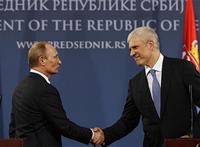 to finance several major economic projects (Moscow has already helped Serbia last year with a $200 million loan to fill the country's budget gap.) According to the Belgrade-based daily Blic, however, Putin has promised to award Serbia with a special $10 billion package to support the local economy. Whether this package will be used depends most of all on us, that is how seriously we are going to approach it, the daily commented. According to its sources, some $3.5 billion will be allocated to the Serbian army.
to finance several major economic projects (Moscow has already helped Serbia last year with a $200 million loan to fill the country's budget gap.) According to the Belgrade-based daily Blic, however, Putin has promised to award Serbia with a special $10 billion package to support the local economy. Whether this package will be used depends most of all on us, that is how seriously we are going to approach it, the daily commented. According to its sources, some $3.5 billion will be allocated to the Serbian army.
Besides, with part of the funding the debts of the oil and gas company Naftna Industrija Srbije (NIS) to the country’s budget will be partially covered, estimated at nearly one billion euro. NIS, whose majority-owner is Russia’s gas monopoly Gazprom, is just a small part of Russia’s energy interests in the country. Besides holding a majority stake in NIS, Gazprom and local gas monopoly Srbijagas plan to set up a joint company that would manage the only gas storage in the country, which is to be supplied with Russian gas.
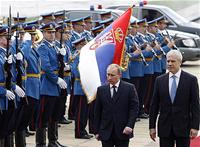 Naturally, Serbia is also a partner in the Moscow-backed South Stream project, and the Gazprom representatives in the Russian delegation that visited Belgrade did not miss the chance to make a presentation to their Serbian colleagues and convince them once again of the advantages of the project (which made some local media report that the project would not go via Croatia but through Serbia will continue directly to Slovenia, with which Gazprom signed an agreement on Tuesday, March 22). “For us there are no limits to our economic cooperation. I think this is one of the major conclusions from our meetings today,” Serbian president Boris Tadic told journalists at a joint news conference with Putin.
Naturally, Serbia is also a partner in the Moscow-backed South Stream project, and the Gazprom representatives in the Russian delegation that visited Belgrade did not miss the chance to make a presentation to their Serbian colleagues and convince them once again of the advantages of the project (which made some local media report that the project would not go via Croatia but through Serbia will continue directly to Slovenia, with which Gazprom signed an agreement on Tuesday, March 22). “For us there are no limits to our economic cooperation. I think this is one of the major conclusions from our meetings today,” Serbian president Boris Tadic told journalists at a joint news conference with Putin.
But, unlike Putin’s visit to Ljubljana a day earlier, where economic topics 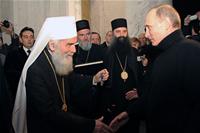 prevailed the agenda (with a focus on the events in Libya), in Belgrade foreign policy issues were more broadly discussed.
prevailed the agenda (with a focus on the events in Libya), in Belgrade foreign policy issues were more broadly discussed.
Although Putin's press officer made it clear that the visit was not planned to coincide with the 12th anniversary of NATO bombings in Serbia, the coincidence could not be avoided. Asked about the lessons from the Kosovo war in the back-light of the recent developments in North Africa, Putin said that the 1999 events in Serbia and what has been recently happening in Libya cannot be compared.
“Besides, I am worried by the ease with which in recent years it is being decided to use military power. How is it possible to protect the civil population by means that are increasing the number of the casualties,” Putin said.
Replying to a question from media concerning his being proclaimed an honorary citizen of Kosovo, Putin explained that everything that was done in Serbia’s interest, would be accepted by Russia. “I can see the political context of the question, but I want to reiterate that if it is in Serbia’s interest, we consider it in line with Russia’s interests,” he added and also explained that Russia had been and would remain Serbia’s ally regarding Kosovo and the reason was the historical closeness of the two countries.
As a proof, while visiting Serbian parliament, Putin pointed that “there was no political party in Russia’s lower chamber of Parliament and beyond who did not feel 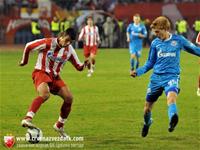 the Serbian people very close.” Led by the warm Russian feelings, Putin supported, although with some reserves, the country's membership to the European Union with the words that "this was in Russia interest but in terms of a NATO membership, things stand differently".
the Serbian people very close.” Led by the warm Russian feelings, Putin supported, although with some reserves, the country's membership to the European Union with the words that "this was in Russia interest but in terms of a NATO membership, things stand differently".
The hosts, in their turn, showed their warm feelings by inviting him to a football match between the juniors of Serbia’s Crvena Zvezda, whose major sponsor is Gazpromneft, and Gazprom-owned Zenith. The result was 1:1.
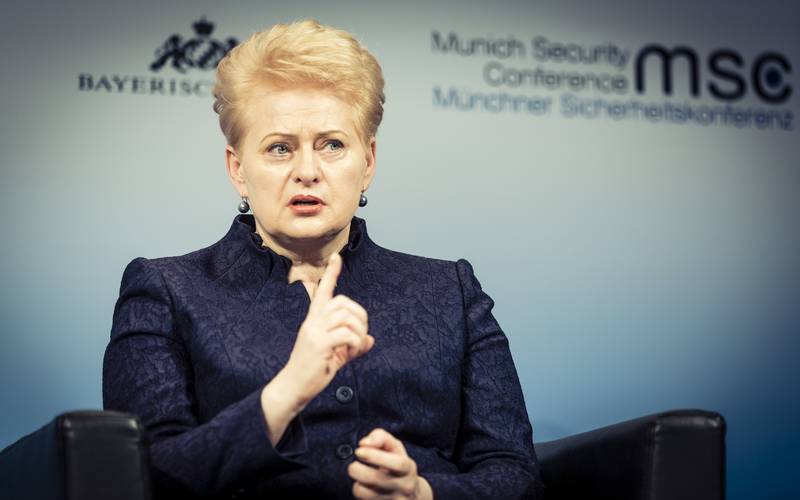 Dalia Grybauskaite | © MSC/Koerner
Dalia Grybauskaite | © MSC/Koerner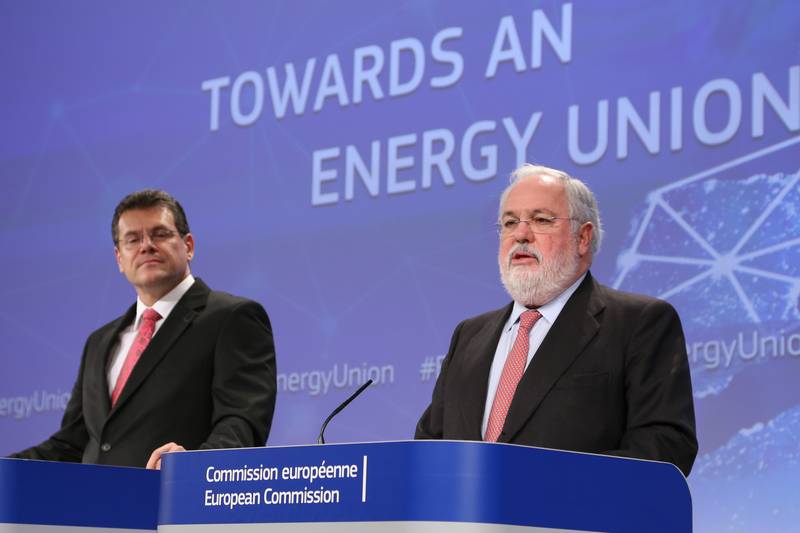 Maros Sefcovic, Miguel Arias Canete | © European Commission
Maros Sefcovic, Miguel Arias Canete | © European Commission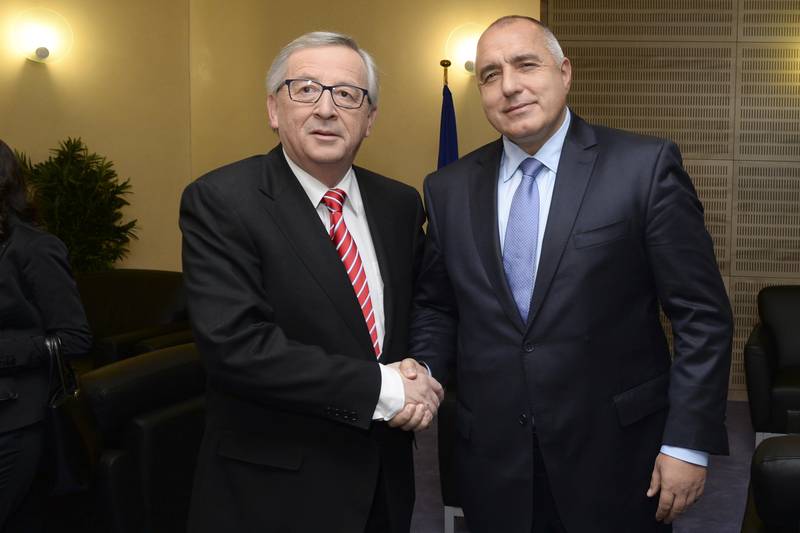 Jean-Claude Juncker, Boyko Borissov | © European Commission
Jean-Claude Juncker, Boyko Borissov | © European Commission